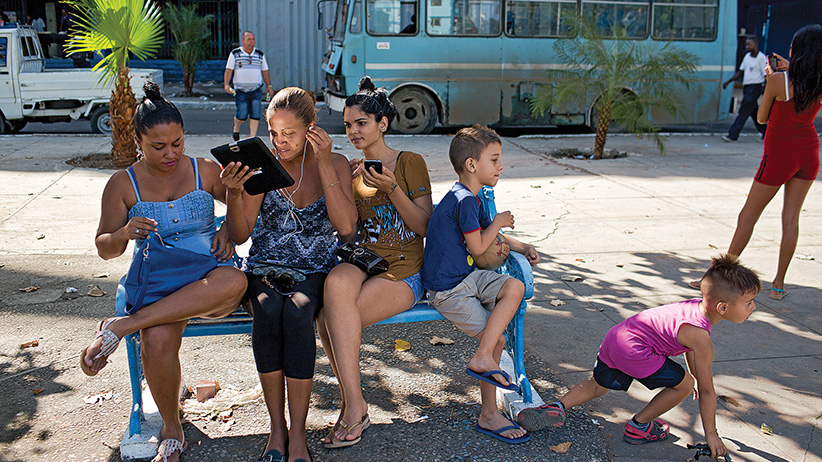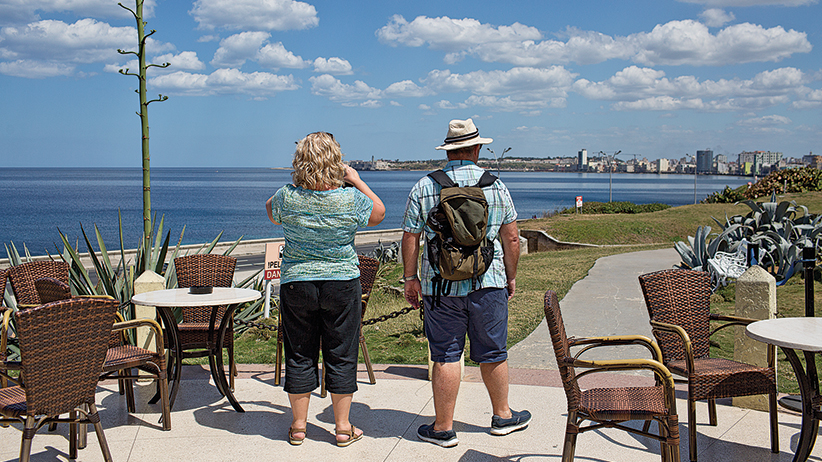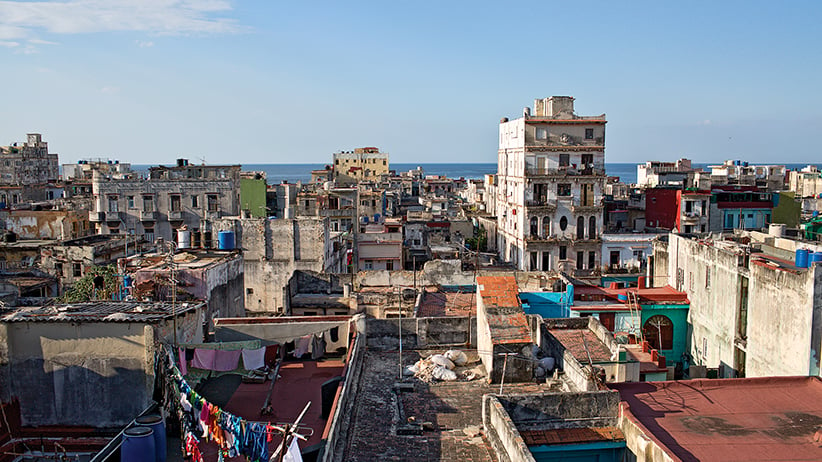Cuba’s evolution: Bringing change, liberty and WiFi
Allen Abel tours the Communist island to learn what Cubans hope the President’s arrival will bring
View of Havana from the luxurious La Guarida restaurant, a famous first stop for all celebrity visits.
Share

Uruguayan interviewer, 1992: “Are there any signs of economic recovery in Cuba?”
Fidel Castro: “No. None.”
Interviewer: “You have opened new avenues for foreign investment in Cuba. Do you not fear U.S. economic invasion just as the Japanese have invaded the United States?”
Fidel Castro: “I wish that would happen!”
The road from Havana to the Bay of Pigs is designated Cuba’s National Highway 1. It flees the city toward the south and east, six lanes of pitted asphalt and wind-blown palm fronds leading from the heartbreaking decay and force-fed nostalgia of the capital, across the dry plains of cattle country, bound for the turquoise Bahía de Cochinos. It was there, in the spring of 1961, that expatriate mercenaries armed by the United States government attempted to annihilate a ragtag revolution that still, 55 years later, doesn’t seem to want to die.
On National 1, two hours from the mojitos at Sloppy Joe’s and the sea-slapped Malecón—and an island away from the all-inclusive Varadero and Cayo Coco resorts where hundreds of thousands of Canadians holiday each winter—not every driver rocks a two-tone ’57 Chevy BelAir with a Bulgarian engine and no windows, contrary to cliché. More likely, even on the nation’s ultimate (but still nearly empty) motorway, he chauffeurs a four-wheeled cart behind a nodding ’05 mare.
This is the country that Barack Obama will visit next week—briefly, historically, and, depending on your politics, either hopefully or hypocritically: Impoverished, defiant, weary, bare-shelved, totalitarian, beautiful, repressive, ever-cool, ever-hopeful Cuba. The one-horsepower paradise of the Communist Caribbean.
“Are you going to see Obama when he comes to Cuba?” a traveller asks the young waiter at a thatched, open-air roadhouse at kilometre 135 called Para Tí, which means “for you,” en route to the famous Bay.
“No,” the camarero replies with a wink. “He’s coming to see me!”
The server is a slender 23-year-old, dressed entirely in black. “Let me tell you my name,” he says. “My name”—he pauses for effect—“is Fidel Castro.”

To be precise, it is Fidel Arián Castro Masco, with Castro being his father’s surname and Masco his mother’s. “My mother’s family are Communists and my father’s hates the system,” Fidelito laughs. “So there is a lot of fighting.”
Taken in a broader sense and stretched over more than half a century, the waiter’s words are a concise summation of U.S.-Cuban relations, or the lack of them, since 1959. If Washington’s Plan A was the Bay of Pigs invasion, and if Plan B was the petulant embargo on trade, direct investment and rum-and-Coca Cola tourism that still is officially on the books, then Obama, in his mind at least, is about to personify a less belligerent Plan C.
“What do you want Obama to bring you as a present?” Fidel A. Castro is asked at the Para Tí. (Maclean’s will pose the same question to dozens of Cubans over the next few days, with some surprising answers.)
“Peace, progress, and Internet!” Castro snaps, without missing a beat.
“WiFi o muerte!” waiter and tourist begin to chant, the rallying cry of a new millennium in an old and haunted country. Nearby, two listless sisters sell stuffed baby crocodiles at the roadhouse souvenir stand. A platter arrives with grilled whitefish and the dish of black beans and white rice that the Cubans call Moors and Christians. Castro the (much) younger brings Cerveza Cristal. There is soccer from Spain on the TV. Broadband or death.
Seven kilometres further east on Highway 1, a side road dips down toward the wind-whipped waterside where the CIA-backed Cubans from Miami—denied potentially incriminating air support by president John F. Kennedy—were slaughtered by the waiting Castroite army and air wing, led personally by Fidel himself. Billboards along the shoulder presage arrival:
HERE A GREAT VICTORY WAS WON
THE FIRST GREAT DEFEAT OF YANQUI IMPERIALISM IN THE AMERICAS
THE MERCENARIES GOT ONLY THIS FAR
The route passes a gargantuan sugar complex named, for some reason, Australia—the elder Fidel’s headquarters during the battle—now an apocalyptic ruin of roofless warehouses and torn-up railroad tracks. Then, at the very end of the road, are a small, shuttered museum with two green tanks and a piston-powered fighter bleaching out front, a memorial to the Cuban martyrs of the battle, and, disembarking to ponder the setting and its meaning, a busload of U.S. tourists.

“Yes, Cuba won at the Bay of Pigs,” says Michael Bishop, a retired IT guy from Portland, Ore. “Often, winning in war doesn’t solve all your problems. But would Cuba have been better off if we had won?”
Ten times a day, on average, charter flights from Miami, Tampa, New York and Los Angeles bring Americans to Cuba to ponder the same dilemma. Officially, all of them are taking part in some form of cultural, educational, religious, or humanitarian sojourn. The folks getting off the bus at the Bay of Pigs are styled “road scholars.”
The restriction, which only the Republican-controlled Congress—not Obama—can modify, keeps Canadians from having to share their cabanas with all those obese, Trump-loving Yanks. But it also means that the hundreds of thousands of U.S. citizens who come to Cuba every year benefit from lectures by Cuban economists, worship with Cuban believers, and experience real fellowship with Cubans who do more than pour drinks and swap towels.
“Before I came here,” Bishop says, “I was all for lifting the embargo. But then I asked a Cuban professor if he thought that the money that would flow in would actually go to benefit the Cuban people. He gave a very roundabout answer, but at the end, he just said, ‘No.’
“As far as I can see, the Cuban government has just used the totalitarian aspect of communism to feather their own nests. I think when Fidel and Che started out, they genuinely wanted to help the Cuban people. But after the Bay of Pigs, they became doctrinaire Communists, and practicality went out the window. As every other place that ever tried it has shown, communism doesn’t work!”
Bishop ponders the scene for a moment. Directly in front of them is a beachfront hotel flying the U.S. flag.
“Eleven million people, 90 miles from Florida?” Bishop muses. “If we open the doors economically, we’ll steamroll Cuba. We’ll roll right over them. They won’t recognize the country they have left.”
Another day. José Martí International Airport, Havana. There’s a kid we’ll call Jonny standing in the crush of Studebaker drivers and self-styled tour guides outside the door where the Americans come out, holding up a piece of cardboard with passengers’ names on it.
“Is Obama’s name on your sign?” Jonny is asked. “What about Mick Jagger?” (The Rolling Stones will perform in Havana, for the first time, three days after Obama and his 2,000-person entourage depart for Argentina. Lead singer Jagger is closer in age to 89-year-old Fidel Castro than he is to 54-year-old Obama. Jagger was born on July 26, which is Communist Cuba’s national holiday.)
“I will get them a taxi,” the kid says.
“What do you want Obama to bring you as a present?”
“Cambio,” he replies.
“What kind of change?”
“More freedom to have a good life in this country. More hope. Change and hope.”
“Why don’t you swim to Miami?” the kid is needled, though this is no joking matter. The waters that separate Florida and Cuba hold the bodies of thousands of men, women and children who, torn between desire and surrender, home and a dream, slipped from rafts, starved on boats, were burned by a couldn’t-care sun.
“Too many sharks,” says Jonny.
There’s a guy we’ll call Fernández at the airport, trying to cajole a rider. “What do you want Obama to bring you as a present?”
“Cambio. Change is a complicated word,” Fernández elaborates. “We have a population that is accustomed to free health, free education, free university. They are not prepared to change everything in one day. Let us say that one day, everything changes and the new government is whatever, whoever. Are we going to give up the things that we are accustomed to, the things we have won?
“But we have to change. Cuba could be one of the top Third World countries. Forget the First World, that’s not what I’m talking about. But look at China, they made some changes and they’re on the top.
“I like what Donald Trump says—50 years of embargo, that’s enough. Trump is apolitical. He is open-minded. He listens to everyone.”
Across the road is one billboard with Fidel Castro’s picture on it and the all-caps words “Embargo—the worst genocide in history,” and another of Fidel with Venezuela’s late leader, Hugo Chávez.
“I am very talkative,” Fernández says.
Downtown, a young pharmacy grad is asked, “What do you want Obama to bring you as a present?”
“Cambio. Change to the economy. Change to being able to get a good job. The Castro brothers are very mind-closed.”
“Why don’t you swim to Florida?”
“Sharks.”
Outside the Museum of the Revolution sits the former palace of the dictator Batista, complete with bullet holes and a “Cretins’ Corner” that ridicules Ronald Reagan and the Bushes, father and son. (“Thanks you cretin for helped us TO MAKE SOCIALISM IRREVOCABLE,” reads the sign under Bush the Younger, who is depicted with donkey’s ears and wearing a Nazi helmet, complete with swastika.)
A gold-toothed man we’ll call Manny is leaning against a fence along with his sister, Liliana, whom he identifies as a freelance salsa instructor. Behind the fence are more old airplanes and tanks and guns and even the actual motor-yacht Granma, which brought Fidel and his brother Raúl and Che Guevara from exile in Mexico to overthrow Batista and his rum-soaked Mafia thugs and make Cuba great again.
“What do you want Obama to bring you as a present?”
“Better relations. Give back Guantánamo. Liberdad.”
“What kind of liberty?”
“Freedom to travel the world. Yes, we are allowed [to travel] but they take all your money. Freedom to buy a decent pair of pants like those.” He fingers the writer’s 20-buck Wal-Mart khakis.
“Do you know how hard it is for my sister to buy milk for her baby? Give me 10 pesos so she can buy milk.”
He settles for five.
“The whole system needs to be changed,” Manny says. “For 37 years, I am living in this system. Do you know when this system will change? Never.”
In February, the dissident network that styles itself the Cuban Commission for Human Rights and National Reconciliation announced that 1,414 Cubans had been detained for political reasons in January. Of those, the commission reported, 59 suffered physical violence or “acts of repudiation.”
“It’ll be fun when we go,” Obama said in February.
“So let’s be clear,” the Washington Post editorial board wrote shortly after, “Notwithstanding Mr. Obama’s expectation that Cuba will ‘be fun,’ his visit will be an ignoble failure if he does not have a meaningful encounter with the island’s most important human rights activists.”
Back to the Bay of Pigs. Waiting for his bus to Varadero is a cultural anthropology student from Brown University in Rhode Island named Michael Petro. He has been in Cuba through the winter, working with the famous Colmenita troupe of young dancers who will perform for the Obamas when they come to Havana next week.
“I came here with a lot of questions,” Petro says, looking out toward the battle museum and its now-silent armaments. “Why are the people who are the most strongly opposed to easing tensions the Cubans themselves who went to Florida? How would I feel if I lost everything I had and had to leave my country? What has the embargo done except make a lot of people hungry? Why is a murderous death-squad leader like Che Guevara seen here as a moral hero?”
The questions float out to sea with the Caribbean wind. Bishop notes that, a week earlier, he was in attendance when the electronic music group Major Lazer performed—more important, were allowed to perform—their global mega-hit Lean On for a crowd of 400,000 Cubans, quite possibly the largest voluntary, non-political assembly in the country’s history.
“There was a sense in the crowd that this was a very important event,” the young American says. “Even though the crowd was mostly young kids who don’t speak English and they couldn’t understand what the group was saying, everyone was just very happy. And they were so excited about the President’s visit, so happy about tensions maybe being eased.”
A recurrent line in Lean On goes like this:
Blow a kiss, fire a gun
All we need is somebody to lean on.
At the Bay of Pigs in 1961, the Americans tried and failed with the gun thing. Now their outgoing President is going to try a little love.
“A revolution is a constant struggle between the future and the past,” Fidel Castro, not the waiter, once said.
“Go back 55 years,” says the American student at the Bahía de Cochinos, “and I’m probably rooting for Cuba.”